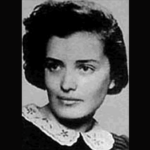Quote:
What can we do apart from resisting? (…) It will not be easy to avenge their crimes against our people, for our every move will be met with massive and arbitrary retribution. (…) But the fate of our people on this earth is already determined. (…) We can either die with them or try to avenge their deaths. Our revenge will have to be unbridled and merciless.
Source:
Jochen Kast, Bernd Siegler & Peter Zinke (1999): The diary of the partisan Justyna. Jewish resistance in Krakow. Berlin: Elefanten Press. The year (1943) indicates the approximate date of origin of the quotation.
Author Bio:
Gusta Dawidsohn-Draenger (1917-1943) was born into an orthodox Jewish family in Krakow. In her youth, she joined the Zionist youth group Akiva, for whose newspaper she wrote articles and on whose board she served. After the outbreak of the Second World War, she was instrumental in coordinating the Jewish resistance against the Nazis. Together with others - including her husband Shimshon Draenger - she smuggled weapons, organized hiding places and fought with partisans in the surrounding forests. She and her husband were murdered by the Germans in November 1943. Between January and March 1943, she wrote down her extensive memories on a roll of toilet paper in prison.
Context:
 This quote, in which Gusta Draenger-Dawidson quotes her husband Shimshon Draenger, bears witness to the armed resistance against the Nazis in Poland. Jewish resistance against the Nazis, often carried out by individuals and small groups, is rarely mentioned in history books. There were also uprisings and revolts in the Warsaw Ghetto, Auschwitz, Treblinka, Bialystok and Sobibor. The largest resistance group, with around 1,200 members, was the Jewish group of Bielski partisans in Belarus. The resistance was diverse: it ranged from leaflets and newspapers to the operation of theaters and schools to food smuggling and document forgery. An estimated 6 million Jews died during the Second World War from 1939 to 1945 in the Shoah, the Nazi genocide.
This quote, in which Gusta Draenger-Dawidson quotes her husband Shimshon Draenger, bears witness to the armed resistance against the Nazis in Poland. Jewish resistance against the Nazis, often carried out by individuals and small groups, is rarely mentioned in history books. There were also uprisings and revolts in the Warsaw Ghetto, Auschwitz, Treblinka, Bialystok and Sobibor. The largest resistance group, with around 1,200 members, was the Jewish group of Bielski partisans in Belarus. The resistance was diverse: it ranged from leaflets and newspapers to the operation of theaters and schools to food smuggling and document forgery. An estimated 6 million Jews died during the Second World War from 1939 to 1945 in the Shoah, the Nazi genocide.Further Reading:
*Julius H. Schoeps, Dieter Bingen & Gideon Botsch (2016): Jewish Resistance in Europe (1933-1945): Forms and Facets.
*Wolfgang Benz (2002): Lexikon des Holocaust, Munich: Ch. Beck.
*Claude Lanzmann (1985): Shoah. Documentary film.
*Jules Schelvis (2003): Vernichtungslager Sobibór, Münster: Unrast.